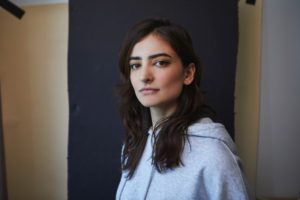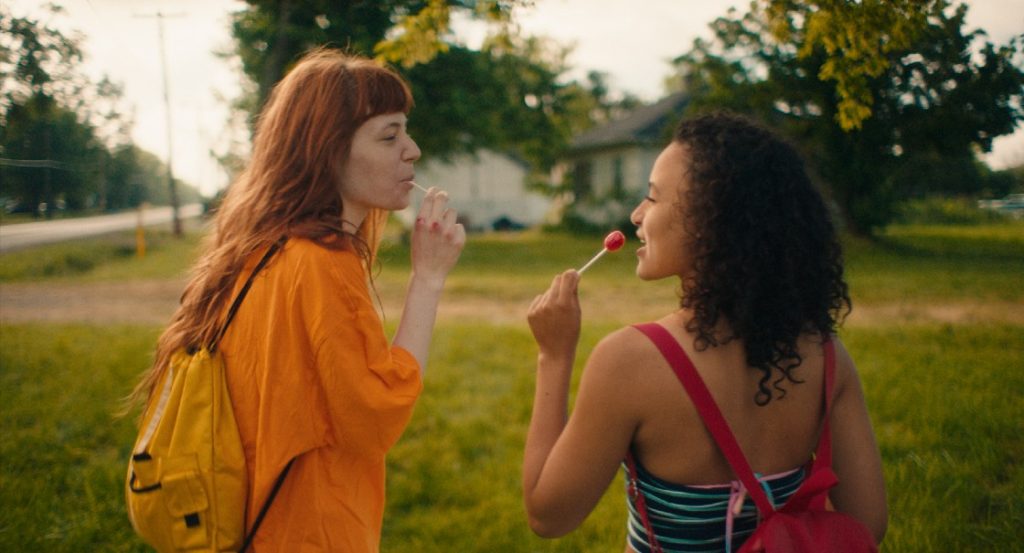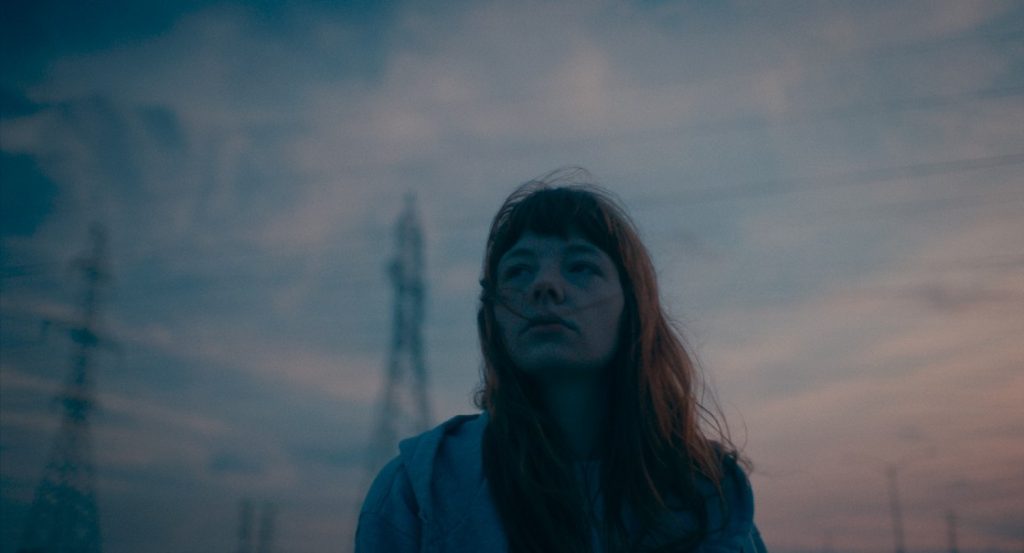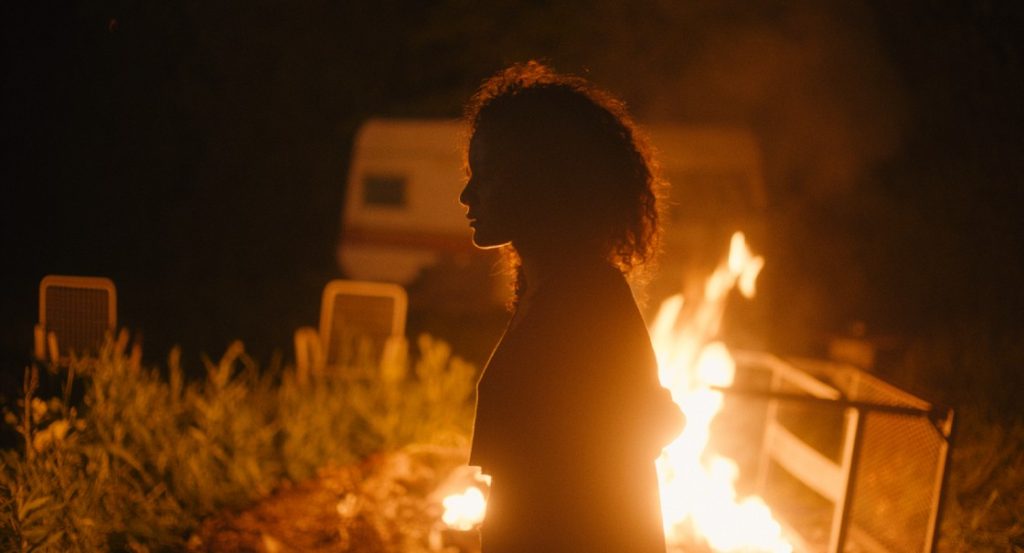
Firecrackers Interview: Jasmin Mozaffari
“I don’t think writing strong female characters is all about making them tough and unbreakable, it’s about showing women in their full complexity — the dark side, the melancholy, the flaws.”
Passionate, restless, fanatical. Michaela Kurimsky and Karena Evans are magnetic as Lou and Chantal, two young women aching to get out of Northern Ontario.
You will smile at their carefree dance parties and shrink as they experience heartache; wishing you could reach through the screen and make everything better.
In just 90 minutes, Jasmin Mozaffari delves into the psyche of these two girls fighting to escape a situation that can easily become routine. Every character, barring a few dirtbags, is dimensional and it’s easy to understand their actions, even if you don’t agree.
FIRECRACKERS is devastating but hopeful, you never stop rooting for these characters. It is a film that feels grounded in small-town Canada but will resonate with people everywhere.
This is not just a coming of age tale — it is a survivor story.
 Jasmin is a Toronto-based writer/director who studied film at Ryerson’s School of Image Arts. A number of her short films including Firecrackers (2013), Wave (2015) and sleep on the tracks (2017) screened at numerous film festivals across North America and Europe.
Jasmin is a Toronto-based writer/director who studied film at Ryerson’s School of Image Arts. A number of her short films including Firecrackers (2013), Wave (2015) and sleep on the tracks (2017) screened at numerous film festivals across North America and Europe.
Her debut feature FIRECRACKERS premiered at the Toronto International Film Festival and she was called a “vital new voice for Canadian Cinema” by the Globe and Mail. The film took home the top prize at the Stockholm International Film Festival for Best Film in Competition and was named as a part of TIFF’s Canada’s Top Ten films of 2018.
Jasmin has since been nominated for the 2018 DGC Discovery Award, as well as four Canadian Screen Awards for FIRECRACKERS including “Achievement in Direction.”
FIRECRACKERS is in theatres in Canada beginning March 29th.
Tell us a little bit about yourself and how you got involved with filmmaking.
Jasmin Mozaffari: I grew up in Barrie, Ontario and went to university in Toronto. At first, I thought I wanted to be a journalist, so I studied Journalism at U of T for one year. Then, I moved onto studying Film theoretically at York University before eventually transferring to Ryerson to study film. It wasn’t until I was about 20 before I realized I wanted to be a filmmaker. I think this was because there weren’t many examples of female filmmakers growing up, so I didn’t realize it was a career path I could choose. When I started making films at Ryerson, it felt so right and I’ve never looked back.
We interviewed you about the first Firecrackers film back in 2015. Can you talk about how the film evolved from your thesis project and what the process was like turning it into a feature-length movie?
JM: When Caitlin (producer) and I made our thesis film Firecrackers at Ryerson, we had no intention of turning it into a feature. It wasn’t until three years after we graduated, and two other short films later, that we decided to apply to the Telefilm Talent to Watch program with an idea to expand Firecrackers into a feature. We were one of 18 projects to get picked for that program in 2016, and I spent the rest of the year writing the script. Even back in 2016, it felt more important than ever to tell a story like Firecrackers that explored themes as big as patriarchal oppression. I think the good thing about a feature is you have the time and space to explore deeper themes and secondary character arcs that you couldn’t in a short. Even though the feature has some of the same characters as the short, I approached the feature as a whole new beast. (Editor’s note: read our 2015 interview here.)

What was it like bringing the film back to TIFF in 2018?
JM: It was amazing. I feel very lucky to have had the opportunity to premiere my first feature at a festival as renowned as TIFF. The festival is much more overwhelming with a feature, than with a short. It becomes all about the business side of things. I didn’t have time to see any other films. It was a reminder of how, even as a director, you have to learn the business side of this industry and learn to navigate that with as much grace as you do the creative process.
This film features two strong, unapologetic, fully realized female characters. How did you balance their strengths with their sensitivities?
JM: I think this is an interesting question because I’m not sure if the same is asked of male characters, yet it should be. I think any time you have characters who are at times brutal, violent, crass — it’s more interesting if there’s a vulnerability underneath that facade, no matter the gender. Chantal, and especially Lou, are incredibly vulnerable characters and that’s what makes them human. I don’t think writing strong female characters is all about making them tough and unbreakable, it’s about showing women in their full complexity — the dark side, the melancholy, the flaws. I still believe it’s hard for certain audiences to stomach the portrayal of women as fully realized human beings.
Firecrackers shields the viewers from some of the difficult subject matter, instead showing the aftermath. Why did you decide to frame the narrative this way?
JM: I think when I’m writing a script, I try to only show what’s absolutely necessary. Moreover, I don’t think we need to see women being sexually assaulted on screen anymore. I was more interested in the reverberations — the consequences — of this patriarchal act. I was more interested in showing the power dynamics that come as a result out of this heinous situation. After all, it’s Lou and Chantal who are punished and not Kyle (and perhaps others) who committed a crime.
Unfortunately, this still happens all the time, all over the world, from college campuses to the Ford / Kavanaugh hearings. I wanted to focus on the victims, the survivors stories, and not give more screen time to small-minded men. This story is not about them.

There are some stunning scenes that use sunsets or bright neon lights, why were these scenes important for you and what was it like filming them?
JM: The aesthetic for this film was guided by the story and the characters all the way. The atmosphere of this film was just as important to telling the story as the dialogue and plot. The beauty or grit of this film is a testament to the months-long search for the perfect locations, and Catherine Lutes’ stunning cinematography. We very much wanted the early scenes to feel hot, imposing, harsh. Later in the film, the mood changes from optimism to a bit of a nightmarish quality, so the palette becomes darker, the camera slows and becomes more still. The colour palette and camera movement and framing were always determined by the emotional state of the lead characters in the scene. This film was always meant to be immersive in that way.
Can you tell us about some/all of the other amazing women who worked on this film?
JM: Almost all the key crew on this film were women. I had two amazing producers by my side, Caitlin Grabham — with who I have Prowler Film — and Kristy Neville. We all graduated from Ryerson Film Studies at the same time. Thea Hollatz, also another Ryerson grad did the amazingly realistic production design. Mara Zigler (also CSA nominated for this film!) went above and beyond in designing the costumes for every single character, all by herself. Simone Smith (also CSA nominated for Firecrackers) edited this film. She’s wonderful and makes a commitment to work with female filmmakers.
Catherine Lutes is an absolute force. She has the best instincts as a cinematographer and should be recognized more for her achievements. We clicked from the moment we met. Last but not least, our two amazing leads — Michaela Kurimsky and Karena Evans. Michaela was a TIFF Rising Star in September and has already has another lead role under her belt. Karena has risen to new heights as a director in the most amazing way with the Drake videos and now P-Valley. I feel so lucky to have worked with this amazing group of women.
Tell us about why you are a feminist and why it’s important to your filmmaking.
JM: I’m a feminist because I need to be. I think that’s just such an integral part of who I am as a person, that it could never be divorced from the films that I create. I think I can always be a better feminist though. I always try to check myself and make sure I’m looking at my art, and life, through an intersectional lens. I’m definitely not perfect, but I strive to improve all the time. I think everyone, not just women, should be looking at the world, and their art, through an intersectional feminist lens.

Who are your favourite women working in the film industry?
JM: I think Dee Rees and Chloé Zhao are two filmmakers I’m very excited about at the moment. I also have continuous love for Andrea Arnold, Lynne Ramsay, Ashley McKenzie, Clio Barnard, Karena Evans, Kelly Reichardt, Melina Matsoukas, Issa Rae, Sadaf Foroughi….I honestly can’t list them all, there are too many!
What’s the best advice about filmmaking you’ve ever received?
JM: In the edit, allow your film to be bad for a little while. Don’t rush to make it ‘good’. This was from Kelly Reichardt.
What are you working on now/next?
JM: Starting to develop another feature — but it’s early days!
Finally, recommend one #MUFFApproved film for our blog readers!
JM: The Rider — Chloé Zhao
Keep up to date with Firecrackers: Facebook | Twitter | Instagram
*This post was originally featured on The MUFF Society.*

